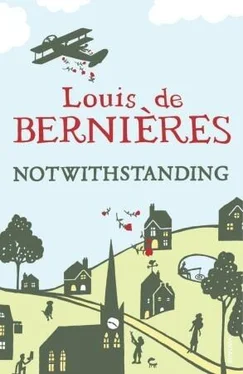Later Robert makes her a little open-sided house with a grown-up perch in it, which he winds with string for better grip, and he installs it in a lilac bush with its back to the prevailing wind. Lizzie takes up residence, sleeping there at night with her head tucked under her wing. Robert goes out every night to say goodnight to her, and she rewards him with contented sleepy noises.
Robert used to teach birds to fly by sitting them on an outstretched arm and running, or by pushing them off. It didn’t work very well, because birds never see the point of flying until they have actually tried it, so now he takes the bird between his hands, and tosses it into the air like someone launching a racing pigeon. Uncle Dick showed him how to do it a couple of years ago, calling it ‘moonlaunch’ and saying, ‘It always works, boy. Toss ’em up, and they can’t help flapping.’ At first it causes Lizzie much comical alarm, and she protests indignantly, since hopping has been perfectly satisfactory so far, but she flaps her wings by instinct, and it is only a few days before she is flying tentatively round the house and returning to Robert’s shoulder, panting from the effort and very pleased with herself. They carry on playing moon-launch long after she has learned to fly. He chases her about the lawn while she takes evasive action, and then he scoops her up and hurls her into the air. She croaks with mock indignation, and then returns for more. Uncle Dick loves to watch it, and says, ‘Wish I had a camera.’ One day in summer, when the family is having lunch in their tiny garden on a Saturday, she takes a few beakfuls of Blue Nun from Robert’s mother’s glass, and puts on a comic display of inebriated flying that culminates in her landing unintentionally in a tureen of soup on the garden table. They drink the soup anyway, since she is generally a fairly clean bird, and she hasn’t pooed in it. She loves showing off to visitors, and performs aerobatics all over the garden for their benefit. She hurtles round and round the house, and the family start to refer to it as ‘Lizzie’s fly-past’. On days of high wind she flings herself about at altitude, and Robert concludes that rooks really do enjoy flying, because they definitely do it when they don’t need to.
Lizzie loves the games that are common to intelligent animals. She plays peekaboo, and chasing and being chased. Most of all she enjoys keepaway and ambushing. She takes nuts and bolts from Robert when he is working on his bicycle, and deposits them on the roof, so that Uncle Dick has to borrow a ladder from John the gardener to get them back down again. Lizzie goes up behind him, tugging at the cuffs of his trousers from the rung below. She particularly likes to make barefooted people dance by pecking at their toes, most especially if the toenails are painted. Dick sees the playful affection that has grown up between bird and boy, and reminds him once again that ‘Birds is like women, they always bugger off in the end, so don’t get too attached. She can’t go before she’s said “silly bugger”, though.’
In fact Lizzie has learned to say something else. The first time it happens is when Robert goes out as usual to call her from her lilac tree, first thing in the morning. He is spooked to hear his own voice, his own special sing-song bird-calling voice, cooing ‘Come on, come on’ from the middle of the tree. It turns out that Lizzie really does only say it when she wants him to come on. This involves a huge physical and intellectual exertion on her part, her whole body shaking with the effort, the feathers on her head fluffing up like a crest. Uncle Dick is disappointed. ‘I’ll get her to say “silly bugger” in the end, if it flippin’ kills me,’ he says, and he redoubles his efforts while Lizzie eyes him suspiciously from her perch, trying to stab him in the eye if he gets too close. It’s one of her golden rules that all that glisters must be pecked. It is also a rule that anything that is new, or that might annoy the humans, must be pecked. Robert accidentally breaks a window with a cricket ball, and when Uncle Dick replaces it, Lizzie systematically removes the putty and eats it. She does it so many times that finally Uncle Dick rigs up an apparatus made of wires to keep her away. She sways and rocks on the wires, balance being almost impossible, but manages to peck the putty out anyway, and Uncle Dick finally cuts strips from a metal tape measure, and sticks them down on to the putty. Lizzie is perplexed, and pecks at the steel strip until she realises the futility of it, whereupon she goes off to stab at the cat, where it sleeps on the lawn. Then she sets off the mole traps by tugging at the chains on the mechanism.
One day Lizzie takes the bait in a rat trap. It smashes across the base of her beak, and she stands for a second, paralysed by pain and shock, with her head pinned down. Fortunately Robert is in the kitchen, and he rushes to release her, his heart thumping with horror and dismay. He feels terrible, because it was he who set up the trap in the first place, ever since he’d seen a rat preening itself in the electricity box above the fridge. Lizzie stands perfectly still, blood seeping out of the cracks in her beak, and Robert sees that she has long fractures and splits running along the entire length of it. His first thought is that she will have to be put down, and his eyes fill with tears of guilt.
He scoops her up and takes her outdoors, but then brings her back inside. There is no one about, and no one to turn to. He puts her down again on the kitchen table, and goes to the telephone in the hallway. He searches desperately inside the spiral-bound telephone book, where finally he comes across the number of Mr Lakin in Farncombe, which his mother has entered under V for vet. The receptionist takes mercy on him because of the panic in his voice, and Mr Lakin talks him through. He tells Robert to look at Lizzie head on, and see if her face is symmetrical. He asks Robert if he knows what ‘symmetrical’ means. Fortunately Robert has recently learned it in maths. It is one of those words that makes you feel intelligent when you use it.
Robert takes Lizzie in his hands, and she croaks forlornly. He scrutinises her carefully and then goes back to the telephone. ‘Her head is still symmetrical,’ he tells the vet, adding, ‘and she’s not bleeding very much any more.’
‘Well,’ says Mr Lakin, ‘she is almost certainly all right then. It means that nothing important has been broken.’
‘What about her beak?’ asks Robert. ‘It’s all split.’
‘Beaks mend themselves,’ says Mr Lakin.
‘Do they?’ says Robert, sceptically. He has heard that beaks are made of the same kind of stuff as hair and fingernails, so surely they couldn’t mend themselves, not until they grow out?
‘You’ll be surprised,’ says Mr Lakin. ‘They really do. She won’t do much pecking until it doesn’t hurt any more, but she’ll be able to pick up food and swallow it. The only thing is, a bird can die of shock. You’ve got to keep it warm, and try to comfort it as much as possible. A drink of water or milk is a good idea as well, but not too much.’
Robert says, ‘Thank you,’ and the vet says, ‘If it takes a turn for the worse, just bring it in.’ Robert says ‘Thank you’ again, even though Uncle Dick isn’t there with his car, and the bus from Lane End takes an hour. He worries that Lizzie would be dead by the time they arrive.
He sits all evening with her cupped in his hands against his chest, talking to her and putting her up to his face. He loves her dry toasty smell, especially on the top of her head. The thought of her dying fills him with grief, and he tries to let hope get the upper hand, because now that his mother has come back from Hascombe he doesn’t want her seeing him cry.
Читать дальше












